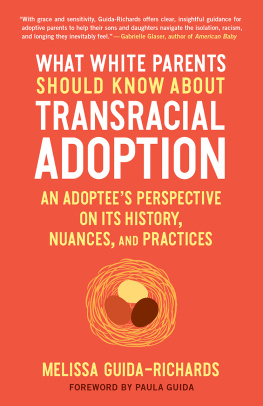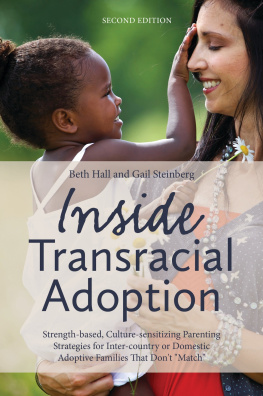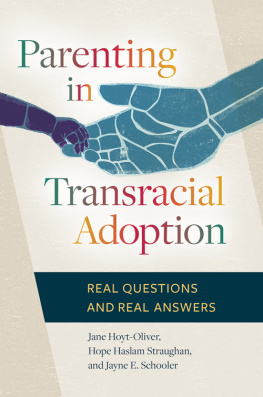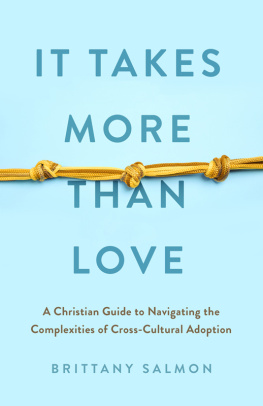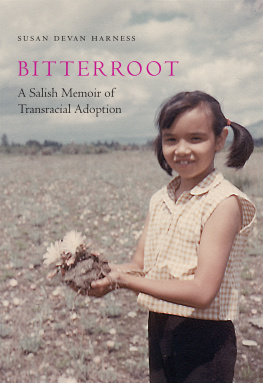
Praise for What White Parents Should Know About Transracial Adoption
Melissa Guida-Richards offers a generous summary of the multifaceted and often-controversial practice of transracial adoption. Part confession, part guide, and part intellectual invitation, Guida-Richards offers expertise with patience and wit. This is a book of experiential knowledge from a transracially adopted person who has thought deeply about the subject. A book that is a true gift to those with enough courage to face it and themselves.
Jenny Heijun Wills, author of Older Sister. Not Necessarily Related.
Guida-Richards provides a powerful and honest look at some of the most important topics in transracial adoptiontopics that have historically all too often been avoided in conversations not only between adoptive parents, but between adoptive parents and their transracially adopted child: white saviorism, white privilege, racial identity, and much more. This should be on the mandatory reading and education list for ALL prospective adoptive parents.
Christine Heimann, founder of Adoptee Bridge, a nonprofit providing post-adoption support for transracial adoptees and their families
Melissa Guida-Richards lays bare a painful truth: That loss is central to adoption. For those who are adopted transracially and transnationally, the disappearance of culture, familiarity, and language carry added complexity. With grace and sensitivity, Guida-Richards offers clear, insightful guidance for adoptive parents to help their sons and daughters navigate the isolation, racism, and longing they inevitably feel.
Gabrielle Glaser, author of American Baby
Im an adoptive parent, I consult hopeful adoptive parents in their adoption journey, and Im an avid adoption book enthusiast. This book is the most comprehensive, relevant, and recommended book to anyone connected and wanting to do better in adoption.
Paige Knipfer, owner of Love Grown Adoption Consulting
What White Parents Should Know about Transracial Adoption tackles the most necessary yet overlooked intricacies of adoption, refusing to gloss over the realities that children of color face. Guida-Richards has delivered a culturally relevant must-read for parents to advance their anti-racism education and to become strong advocates for their children.
Kira Omans, actor, model, advocate, and transracial adoptee
Copyright 2021 by Melissa Guida-Richards. All rights reserved. No portion of this book, except for brief review, may be reproduced, stored in a retrieval system, or transmitted in any form or by any meanselectronic, mechanical, photocopying, recording, or otherwisewithout the written permission of the publisher. For information contact North Atlantic Books.
Published by
North Atlantic Books
Berkeley, California
Cover art gettyimages.com/chrupka
Cover design by Jasmine Hromjak
Book design by Happenstance Type-O-Rama
What White Parents Should Know about Transracial Adoption: An Adoptees Perspective on Its History, Nuances, and Practices is sponsored and published by North Atlantic Books, an educational nonprofit based in Berkeley, California, that collaborates with partners to develop cross-cultural perspectives, nurture holistic views of art, science, the humanities, and healing, and seed personal and global transformation by publishing work on the relationship of body, spirit, and nature.
North Atlantic Books publications are distributed to the US trade and internationally by Penguin Random House Publishers Services. For further information, visit our website at www.northatlanticbooks.com.
Library of Congress Cataloging-in-Publication Data
Names: Guida-Richards, Melissa, 1993 author.
Title: What white parents should know about transracial adoption : an
adoptees perspective on its history, nuances, and practices / Melissa
Guida-Richards.
Description: Berkeley, CA : North Atlantic Books, [2021] | Includes
bibliographical references and index. | Summary: A guide for white
parents of transracially or transnationally adopted children Provided
by publisher.
Identifiers: LCCN 2021019827 (print) | LCCN 2021019828 (ebook) | ISBN
9781623175825 (trade paperback) | ISBN 9781623175832 (ebook)
Subjects: LCSH: Interracial adoption. | Intercountry adoption. | Adoptive
parents. | Adopted childrenPsychology. | Ethnicity in children. | Race
awareness.
Classification: LCC HV875.6 .G85 2021 (print) | LCC HV875.6 (ebook) | DDC
362.734089dc23
LC record available at https://lccn.loc.gov/2021019827
LC ebook record available at https://lccn.loc.gov/2021019828
For adoptive parents like mine, who just need a little extra help to do the work
Foreword
My name is Paula, and I was born in Portugal in a little town named Ovar where I was raised until I was nine. I grew up very poor and lived in a small three-room house with my parents, younger sisters, and grandma. In 1967, my maternal grandfather made arrangements for us to come to the United States to have a better life. We came at the end of 1969, went to school, and by the age of twelve, I was helping out my parents by washing dishes in a restaurant. By 1976, at the age of sixteen, I had met the love of my life who would later be my husbandhis name was Rocky.
Being raised in a conservative family, I was not permitted to date at sixteen. It was rough waters when I told my dad that not only did I have a boyfriend, but that my boyfriend wanted to meet him. My dad decided to give Rocky a chance, but we were only allowed to see one another with a chaperone. By 1979, we were married. Over the next twelve years, we traveled and had a wonderful life, but we knew that something was missing. In 1990, my husband and I found a beautiful new colonial home in Fishkill, New York, where we knew we wanted to raise our children.
Unfortunately, years went by and we were not able to conceive. The attorney that did the closing on our house had mentioned adoptionshe had adopted her oldest son through an agency and was very happy with them. By the time we met her, her son was already well on the way to becoming an attorney himself. She gave us the information so we could get in touch with the adoption lawyer she used, and we were able to find out more about the process.
At that point in time, my husband and I did not want to know the cause of our infertility. In my heart of hearts, Ive always thought that if I couldnt have biological children, the one thing I wanted to do was adopt and give a child the love, the home, and everything else they needed. We told the agency and lawyer that we were seeking an infant that would resemble us and, lo and behold, six months later we got a phone call letting us know about a child. We were sent a small little picture and vitals of a baby girlas soon as we saw the picture, Rocky and I fell in love. We said yes immediately, without hesitation. About three months later, after a lot of paperwork and formalities, Rocky and I traveled to Colombia to meet her for the first time.
We did more paperwork processing in Colombia, came home, and several weeks later after the papers were finalized, we were able to bring Melissa home. Rocky and I decided when we first adopted that we werent going to let our children know that they were adopted because we wanted our children to have a sense of family and belonging. In particular, I wanted them to know that they belonged with the rest of the children in our family and not be treated differently or as outsiders.
Though it is not an excuse for my actions, I do want to share that it was not with malicious intent that we made these decisions, but the way of thinking to which my family was accustomed. We were raised in a very traditional way, in small towns that did not recognize the nuances of race and ethnicity.
Next page
